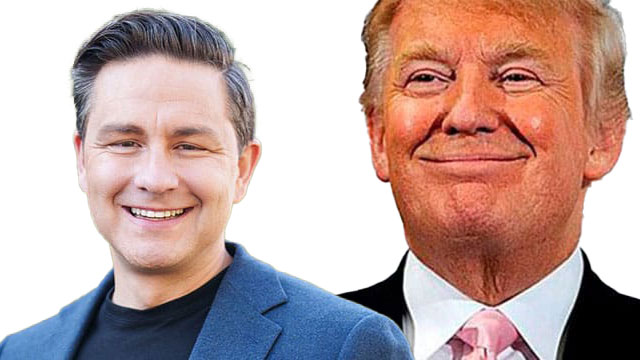Canada is in a fight for its soul, and Canadians must choose whether to resist or follow the U.S. into division and decline

For interview requests, click here
There is a huge gap between what happens in Ottawa or Washington, DC, and what happens in Stratford, Ontario, or Weyburn, Saskatchewan. That is why I am trying not to get caught up in all the hand-wringing over the likely election of Pierre Axe-The-Tax Poilievre as prime minister of Canada or the impending return of the soul-less Donald Trump as president of the Divided States.
Yes, both of these events will have an impact on our economy, in the price of goods we buy, the jobs we gain or lose, and ultimately our progress on building a better social framework than the one we inherited, as well as our ability to address threats like climate change.
Some of my U.S. friends hate everything Donald Trump stands for and have declared they will move to Canada when he takes power. I understand the disgust they feel for those who voted that reckless fool back into power, and yet I wonder whether running north to a country they may not fully understand is the right response.
This flee-U.S. phenomenon is not new. Canada was built on the influx of United Empire Loyalists after the American Revolution in the late 18th century. In more recent times, Canada became home to conscientious objectors during the Vietnam War in the 1960s and early ’70s. But what does this new generation of emotional refugees know about the Canada of today? And, if it’s not to avoid going to war, what exactly are they trying to escape?
I want to ask them whether they’ve thought about staying home and trying to correct the course of their own country. I also want to ask them what they expect of us. Are we to be nothing more than a Due South cliché of naïve virtue in their minds? What happens when they begin to understand the very real challenges our country faces? What happens when they discover our prime minister-in-waiting is also an anti-vax, climate change skeptic?
And what do my wife and I choose to do about our plans to visit the United States? We love exploring the rural loneliness of Montana, the rugged coast of Oregon, the spectacular parks of southern Utah and the towering redwoods of California. We love the studiously eclectic little holes-in-the-wall in forgotten towns off America’s blue highways. We also love the countless encounters with kind-hearted Americans who just want to be hospitable.
Knowing that some of us are on opposite sides of a great divide, will we be able to look them in the eye and still find a way to connect?
I remember travelling to a country music festival in rural Montana shortly after Trump was first elected president in 2016. I honestly didn’t know what to expect, and yet almost everyone I met there apologetically made a point of saying, “I didn’t vote for him.” I remember thinking, well then, if none of you chose this guy, then who the hell did?
Avoidance. That’s probably what we’ll all do. The story is too raw, the rhetoric too heated, the beliefs too fossilized for any of us to try to have a civil conversation or reach a deeper understanding.
I am in the cohort that believes Trump’s term in power will have far-reaching and devastating consequences on the U.S.’s democratic institutions, its healthcare, its education system, its national security and its economy. History, I believe, will look back at this election as the tipping point in which the American Dream was officially declared dead and this once-great superpower will begin an unstoppable slide into decline.
In fact, I believe the election of Trump is more a symptom than a cause – a desperate Hail Mary for an elusive carefree prosperity that can never be regained and probably always was more illusory than real.
For those reasons, when I meet my American friends, I will look at them with regret and empathy. I will know that some of them may not yet be aware of what the future holds for their once-swaggering country, their families and their futures.
And I will also wonder what it will mean for Canada – a country that long ago knuckled under the overwhelming cultural, economic and military power of its neighbour to the south. What now, now that we must figure out how to stand on our own in a hostile world?
Ultimately, I fear we will once again mimic the social shifts that are happening south of the border. Will we also allow ourselves to become a less-caring, narcissistic nation in which misogyny is tolerated, and TV personalities become our experts?
Or will we hold fast to our values as a country with a clear worldview and a powerful sense of communality?
There are forces at work in Canada that would like us to go down the road to a more authoritarian state. Now, more than ever, those of us who care must stand firmly against it. Because if we fail, there is nowhere to flee.
Doug Firby is an award-winning editorial writer with over four decades of experience working for newspapers, magazines and online publications in Ontario and western Canada. Previously, he served as Editorial Page Editor at the Calgary Herald.
Explore more on Authoritarianism, Democracy, Western values, Western civilization
The views, opinions, and positions expressed by our columnists and contributors are solely their own and do not necessarily reflect those of our publication.
© Troy Media
Troy Media is committed to empowering Canadian community news outlets by providing independent, insightful analysis and commentary. Our mission is to support local media in building an informed and engaged public by delivering reliable content that strengthens community connections, enriches national conversations, and helps Canadians learn from and understand each other better.


I find myself with the same feelings about Canada. As an Albertan I am experiencing an authoritarian provincial government wreaking havoc on public institutions and I know which way the wind blows. Much of the issue of the far right in Canada can be traced back to the International Democracy Union (IDU) and the work of Stephen Harper as it’s chair. An unelected,unaccountable activist deconstructing western democratic order globally.